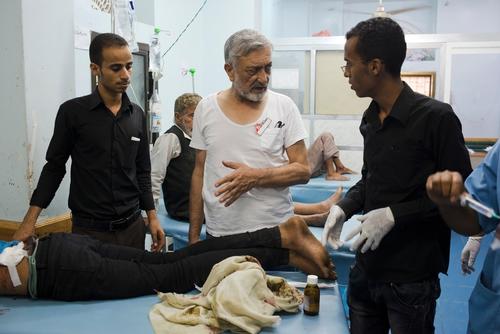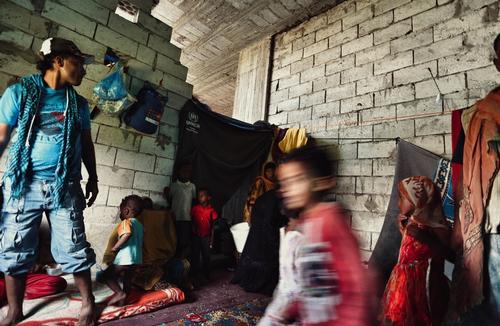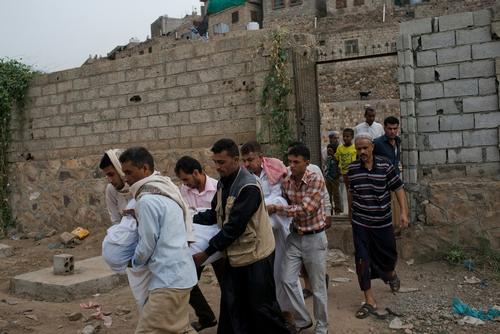With the conflict escalating in Yemen, MSF’s Dr Mahmood Menapal spent four months in Taiz, a city on the frontline. Having grown up in Afghanistan, however, and having survived a bomb attack in Pakistan, he was undaunted by working under airstrikes and sniper fire.
“I arrived in Yemen in late May. In the areas affected by the fighting, such as Taiz, Al Dhale, Lahij and Aden, the humanitarian situation was horrible. Thousands of people were trapped behind the frontlines, unable to reach the few health facilities that were still functioning, and unable to get hold of food and clean water. It was, and still is, a devastating situation.
I was sent straight to Taiz, in the southwest of the country, to assess the medical needs in that area. When I arrived in the city, the situation was quite tense and there were many injured people as a result of the fighting and airstrikes. Most of the hospitals and health facilities had shut down because of the shortage of medical supplies, fuel and water, but the hospitals that were still open had been receiving many war wounded. They urgently needed surgical instruments, medical kits and other essential supplies.
True to the nature of MSF – that is, neutral, independent and impartial – we identified several hospitals on both sides of the conflict to support with supplies. We also donated kits for neuro, vascular, orthopaedic and abdominal surgery to a number of different hospitals.
At the beginning, we were able to move quite safely from our house and office to the hospitals, but as the situation got worse – with active frontlines shifting on a daily basis, with ground shelling and with snipers all over the city – it was impossible to move freely and safely, both for the MSF teams and for ordinary Yemenis.
I didn’t have much fear, as I’ve lived in this situation before. I grew up in a war zone in Afghanistan, so being in Yemen wasn’t terrifying. But I was really worried about the snipers.
Snipers and fighters don’t discriminate between a fighter and a civilian, so people were too scared to move around the city. We couldn’t see where the snipers were located, but it was clear from our patients’ wounds that the snipers were shooting to kill. We treated many patients with injuries from snipers’ bullets, and most had chest and head wounds.
Some nights we couldn’t sleep because of the sound of the planes and the explosions. During the day, too, there were airstrikes and the city filled with dust and smoke. It was a very dangerous situation but we were so determined to provide humanitarian aid to the vulnerable and the wounded. It was really difficult, but we tried our best. One month before I left Taiz, the violence escalated and at one point 4,000 injured people were being treated in one hospital. People die easily in this situation, as there is a huge lack of essential medical supplies, including chest tubes, anaesthetic drugs, IV fluid, sutures and antibiotics. If we hadn’t been there, there would have been many more dead.
During my time in Yemen, I had so many flashbacks. As an Afghan who lived through many years of airstrikes and fighting, being in Yemen brought all these memories back. After I left Afghanistan in 1983, I moved to Pakistan, where I started working as a doctor with MSF in 2001. But after 29 years of serving the community in Pakistan, my house got bombed. That is when I decided to leave the country. In 2012 I claimed asylum in the Netherlands with my wife and two daughters, and the next year started working with MSF again – first in South Sudan and then in Yemen.
I was very sad to leave Taiz. My colleagues and I had started the project from zero. I hope that the crisis in Yemen will end soon, but if it does not, I hope I will be able to return to Yemen to help save the lives of those who are suffering from this indiscriminate war.”
MSF in Taiz
MSF has been providing emergency medications and surgical supplies since early May 2015 to hospitals in Taiz which are receiving large numbers of people wounded in the violence. These include Al Jumhori, Al Thawra, Al Rawdah, Military and Al Qa’idah hospitals. MSF has also set up and equipped three emergency rooms at Al Rawdah hospital to allow extra space for handling mass casualties. Four MSF doctors and one MSF nurse are working in the emergency room of Al Rawdah hospital. MSF is also paying the salaries of 27 local hospital staff to ensure the emergency room can operate around the clock. Since 15 May 2015, Al Rawdah hospital has received a total of 3,821 war-wounded patients, of whom 308 have died, including 15 women. MSF is also running an ambulance service for a hospital-to-hospital referrals system; currently it has two vehicles, but this may be increased depending on the need. Recently MSF opened a 100-bed hospital for mothers and children, providing obstetric and gynaecological care, as well as paediatric care with a focus on children under five. An MSF emergency team of four international staff and eight Yemeni staff is based in Taiz to assess people’s medical needs and respond where necessary.






